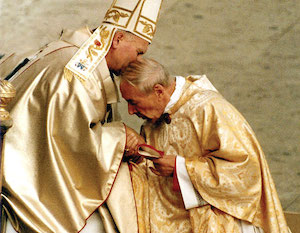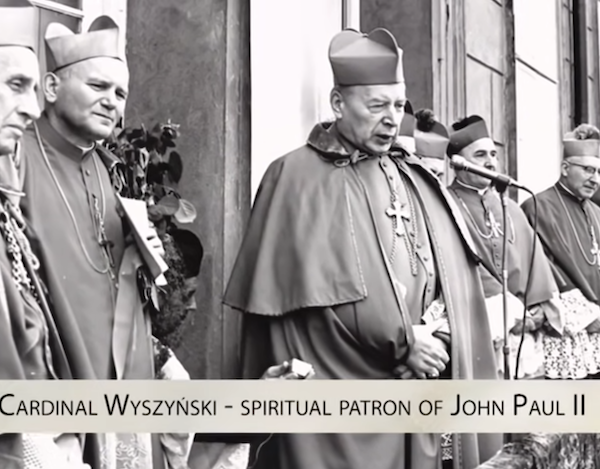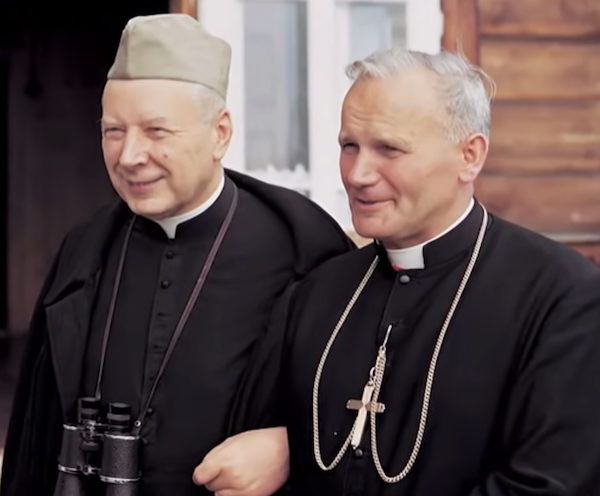Primate of the Millennium
- GEORGE WEIGEL
Cardinal Stefan Wyszyński, recently beatified, courageously led the Church in Poland through its most consequential period.
 Pope Pius XII took one of his boldest decisions when, on Nov. 12, 1948, he named the 47-year-old Stefan Wyszyński (a bishop for only two years) as archbishop of Gniezno and Warsaw and primate of Poland. Soon after, Wyszyński made his own consequential decision: The Church would try to reach some sort of modus vivendi with the new communist regime.
Pope Pius XII took one of his boldest decisions when, on Nov. 12, 1948, he named the 47-year-old Stefan Wyszyński (a bishop for only two years) as archbishop of Gniezno and Warsaw and primate of Poland. Soon after, Wyszyński made his own consequential decision: The Church would try to reach some sort of modus vivendi with the new communist regime.
It was the judgment of an astute political realist who understood just how badly World War II had wounded the Polish Church, and indeed Poland itself, which had seen 20% of its population killed between 1939 and 1945. The Church "had shown in Dachau and in the Warsaw Uprising that we have learned how to die for the Church and for Poland," Wyszyński believed; now, as the country rebuilt itself in the harshest years of Stalinism, the Church should show that it knew how to live, and to help Poland live.
Over the next three decades, the former professor and clandestine military chaplain put to work the Catholic social doctrine he had once taught at the seminary in Włocławek. In doing so, Wyszyński became the defining figure of Polish Catholicism between the Second World War and the rise of Solidarity — and thereby helped make possible the election of a Polish pope. Today, he is revered not only as one of the most influential churchmen of the 20th century, but also — since his beatification in Warsaw on Sept. 12 — as "Blessed."
'Render unto Caesar'
Upon becoming primate of Poland in 1948, Archbishop Wyszyński led a reform of Polish seminaries, giving students a much more rigorous intellectual formation. At the same time, he spoke to the heart of Polish piety by appeals to Our Lady of Częstochowa, the famous "Black Madonna" whose image he placed on his coat of arms (but without a crown, because, he said, Poland was too poor for her queen to wear a crown). He was prepared to support social and economic reform in Poland even as he rejected communist atheism and communist political brutality. Thus, in 1950 he led the Polish episcopate in reaching a 19-point accord with the communist regime, which granted some free space for the Church's pastoral life while the Church acknowledged the regime as Poland's legitimate government and promised to work for national reconstruction. The agreement did not sit well in Rome, where the primate was criticized. It would not be the last time Wyszyński's striking combination of tough-minded strategic resolve and tactical flexibility would prove wiser than the approach of the Vatican's diplomats.

True to form, the communists began reneging on the deal, doing everything in their power to turn the Catholic Church into a subsidiary of the Polish state; their underhanded tactics included creating faux-Catholic groups of priests and laity as alternatives to the real Church. Tensions reached the boiling point when, in 1953, the regime issued a decree claiming the authority to appoint and remove pastors, parish priests and bishops. Wyszyński, now a cardinal, led the Polish episcopate in an epic act of resistance. Preaching at Warsaw's St. John's Cathedral, the primate laid down his challenge in no uncertain terms: "We teach that it is proper to render unto Caesar the things that are Caesar's and to God that which is God's. But when Caesar sits himself on the altar, we respond curtly: He may not." Shortly thereafter, the bishops met in Kraków and made Wyszyński's position their own: "We are not allowed to place the things of God on the altar of Caesar. Non possumus [We cannot]!"
The Great Novena
On the night of Sept. 25-26, 1953, Cardinal Wyszyński was arrested and interned for three years, first in a monastery and then in a convent. He put that triennium to good use, planning the implementation of his second historically consequential decision. Poland would celebrate the millennium of its baptism in 1966. The years leading up to that celebration ought to be an opportunity to re-catechize the entire country. Thus, while under house arrest, Wyszyński devised his Great Novena — a nine-year program of catechetical and pastoral renewal he launched in 1957, a year after being released from internment.
The symbolic centerpiece of this Great Novena was the pilgrimage of the image of the Black Madonna to every parish in Poland. The crowds rushing to meet Poland's queen were so colossal, however, that the communists "arrested" Our Lady and confined her to the Jasna Góra Monastery in Częstochowa. Undeterred, Wyszyński, master of the public gesture, continued the pilgrimage by sending the icon's frame from parish to parish. Everyone knew who was "inside" that frame — just as everyone knew who had been made to look fools.
The Great Novena was more than an exercise in mass popular piety, however. During those nine years, the country was systematically re-catechized, and the lasting impact would earn Wyszyński the title "Primate of the Millennium."
Each year had a theme (faith, the Ten Commandments, the moral life, the family and so forth), and sermons and religious education classes explored a given theme for a full year. Twenty years later, the workers at the Lenin Shipyard in Gdańsk and the other sites where the independent Solidarity trade union was born were the children who had learned the truths of Catholic faith, including the truths of their own dignity, in unheated church basements during Stefan Wyszyński's Great Novena.
A powerful partnership
Cardinal Wyszyński's relationship with Karol Wojtyła, whom he would help elect pope in 1978, was complex.
He had approved Wojtyła's nomination as auxiliary bishop of Kraków in 1958 but was not enthusiastic about the possibility of Wojtyła becoming archbishop of that city in 1962. He didn't know Wojtyła well at that point and imagined him an intellectual who could be easily manipulated by the communists — who had the same mistaken impression. Thus Wyszyński proposed several other candidates for Kraków, finally agreeing to Wojtyła in late 1963.

The primate would soon learn that the younger man was as shrewd a political operator as himself, and the two of them made a formidable team — Wojtyła always deferring to Wyszyński and cleverly avoiding the traps the regime laid to try to demonstrate a rift between the two men. Wyszyński, for his part, watched with satisfaction as Wojtyła, a man not naturally given to raising his voice, learned to be a vocal public advocate of human rights for all and a deft critic of communist lies and idiocies. The two also worked together to achieve reconciliation between Polish and German Catholics, in an initiative that enraged the communists, even as they jointly resisted ill-advised efforts by Vatican diplomats to insert themselves into the ongoing debate between the Polish Church and the communist regime.
During the second conclave of 1978, Wyszyński was initially skeptical about the suggestion of his friend, Cardinal Franz König of Vienna, that Karol Wojtyła could be elected bishop of Rome. But once he grasped the reality of that possibility, the primate lent his considerable support to the idea — and rightly saw in Wojtyła's election the ultimate vindication of his own efforts since World War II. The picture of the two men embracing at John Paul II's inaugural Mass on Oct. 22, 1978, is one of the great images of modern Catholicism (see top image).
Cardinal Wyszyński later died of abdominal cancer on May 29, 1981 — just as John Paul II was recovering from the assassination attempt of May 13.
Some 40 years after his death, Blessed Stefan Wyszyński remains celebrated as the embodiment of a true churchman. His courage and tenacity, rooted in a deep faith, set an example for all of us, especially in those moments when we, too, must say, Non possumus.
❧
❧
 This is Meaghen Gonzalez, Editor of CERC. I hope you appreciated this piece. We curate these articles especially for believers like you.
This is Meaghen Gonzalez, Editor of CERC. I hope you appreciated this piece. We curate these articles especially for believers like you.
Please show your appreciation by making a $3 donation. CERC is entirely reader supported.

Acknowledgement
 George Weigel. "Primate of the Millennium" Columbia (November, 2021): 24-25.
George Weigel. "Primate of the Millennium" Columbia (November, 2021): 24-25.
Reprinted with permission of Columbia.
The Author

 George Weigel is a Distinguished Senior Fellow of the Ethics and Public Policy Center in Washington, D.C. He is author of The Fragility of Order: Catholic Reflections on Turbulent Times; Lessons in Hope: My Unexpected Life with St. John Paul II; Evangelical Catholicism: Deep Reform in the 21st-Century Catholic Church; Witness to Hope: The Biography of Pope John Paul II; Roman Pilgrimage: The Station Churches; Evangelical Catholicism; The End and the Beginning: John Paul II—The Victory of Freedom, the Last Years, the Legacy; God's Choice: Pope Benedict XVI and the Future of the Catholic Church; Letters to a Young Catholic: The Art of Mentoring; The Courage to Be Catholic: Crisis, Reform, and the Future of the Church; and The Truth of Catholicism: Ten Controversies Explored.
George Weigel is a Distinguished Senior Fellow of the Ethics and Public Policy Center in Washington, D.C. He is author of The Fragility of Order: Catholic Reflections on Turbulent Times; Lessons in Hope: My Unexpected Life with St. John Paul II; Evangelical Catholicism: Deep Reform in the 21st-Century Catholic Church; Witness to Hope: The Biography of Pope John Paul II; Roman Pilgrimage: The Station Churches; Evangelical Catholicism; The End and the Beginning: John Paul II—The Victory of Freedom, the Last Years, the Legacy; God's Choice: Pope Benedict XVI and the Future of the Catholic Church; Letters to a Young Catholic: The Art of Mentoring; The Courage to Be Catholic: Crisis, Reform, and the Future of the Church; and The Truth of Catholicism: Ten Controversies Explored.




